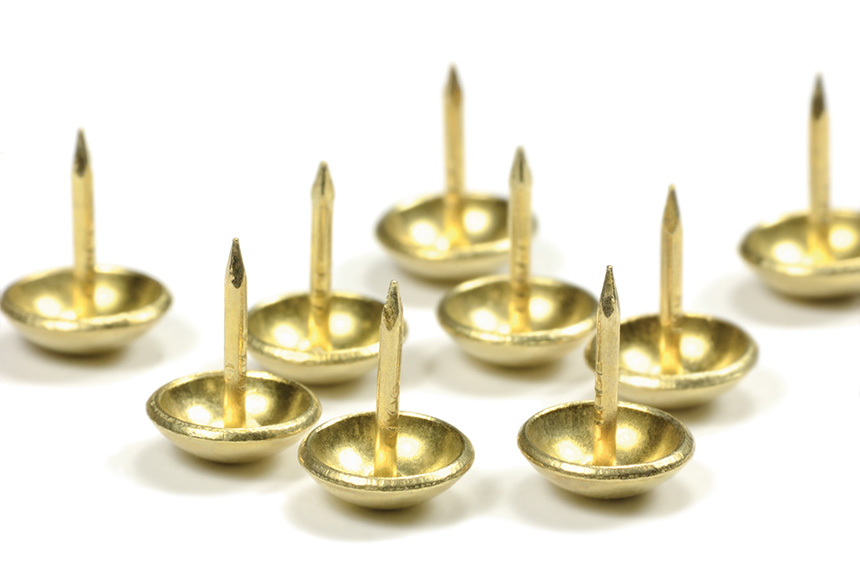Managing editor and logophile Andy Hollandbeck reveals the sometimes surprising roots of common English words and phrases. Remember: Etymology tells us where a word comes from, but not what it means today.
An object that is made of lead or appears to have the same properties as lead is called leaden. The same relationship is apparent in wood and wooden, in flax and flaxen, in gold and golden, and in other similar word pairs.
The lexical process that produced those words also produced brazen. The word brazen — bræsen in Old English — literally means “made of brass.” Brass is a copper alloy — in modern production it’s mixed with zinc — that is harder than pure copper. And that hardness might have shaped brazen into the epithet we use today.
In the 1570s, we start to see written use of the negative phrase “brazen-faced,” the implication being that a face made of brass is too hardened to show emotion — specifically shame. For example, in Shakespeare’s King Lear, written around 1606, the Earl of Kent calls Oswald a “brazen-faced varlet” for claiming that he doesn’t know who the Earl is. He’s brazen-faced because he’s lying with a straight face.
As this metaphorical sense grew, people began to use it without necessarily recognizing the link to brass. Brazen-faced and later just brazen came to mean “audacious, impudent” and then, as we know it today, “bold, shameless, and disrespectful.”
But there’s another metallurgical angle that may have influenced the evolution of this word.
I mentioned golden earlier. Gold has long been recognized as a valuable substance — the earliest known gold coins were minted in the 6th century B.C. in Asia Minor. But the first successful gold coinage to be minted in England — called Nobles — didn’t appear until 1344, a time when brazen referred only to brass.
Everyone knew that gold was valuable, but the Royal Mint establishing gold coins as a medium of trade set that belief into economic law. This probably had an effect on people’s unconscious view of the intrinsic value of gold … and also of brass.
The thing about brass is that, when polished, it looks a lot like gold — but it’s much cheaper. Brass was the cubic zirconium of precious metals. If you wanted something to look fancy and expensive but couldn’t afford the cost of gold, you would make it out of brass.
In a time before the metaphorical sense of brazen had become common, the word was considered by many to be an antonym of golden — or of golden’s fancier Latinate synonym aureate, from aurum, the Latin word for “gold.” So, along with the “hardened to shame” sense, the metaphorical use of brazen also implied someone passing themself or their ideas off as precious gold when they’re really just cheap brass.
There is no sense of impudence or shamelessness in the phrase “getting down to brass tacks.” This phrase isn’t very old: It appeared in the mid-19th century and became popular in the 1910s. Its origin, however, is a bit of a mystery. One belief is that it referred to tacks in dry goods stores that were nailed to a countertop and used for measuring; this would imply a sense of precision, not exactly how we use the phrase today.
Brass tacks were also commonly used in upholstering. Imagine an upholstered chair, for example: If you’re literally getting down to the brass tacks, it probably means that you’re removing the upholstery and batting, reducing the chair to its most basic form — the frame, the thing that makes it a chair. So one could see “getting down to brass tacks” as removing the less important parts and focusing on the essential or quintessential elements of an object or situation.
Either way, today’s metaphorical brass tacks are the aspects that are of the most immediate importance. And brazen attacks, to the vast majority of English speakers, have lost all connection to the shiny metal alloy.
Featured image: Shutterstock
Become a Saturday Evening Post member and enjoy unlimited access. Subscribe now




Comments
Mr. Hollandbeck, I’m not surprised your golden boy here is just curious if brass has any connection with a woman’s brassiere. What a thing to ask! I wouldn’t answer him back. No.
Gotta tell ya, I particularly love this week’s feature Andy on the history/relationship of brass, brass tacks and brazen! You do get down to the brass tacks of it all beautifully, or shall I say the nitty-gritty? I’ve used the latter at various times myself when needed in business: “Let’s just get down to the nitty-gritty of how this scheduling fiasco could have happened, as to never occur again; so I don’t have egg on my face for something that wasn’t my fault!!”
It’s great how you connected brass with gold as metals. I found that aspect really interesting. Brazen is still my favorite word here. I’ve been called that a time or two, but sometimes you have to be to get the job done. Actually I’d like to learn if the word ‘brassiere’ has any connection to brass otherwise, Andy. Seems like it would or should, but perhaps not. Just curious.